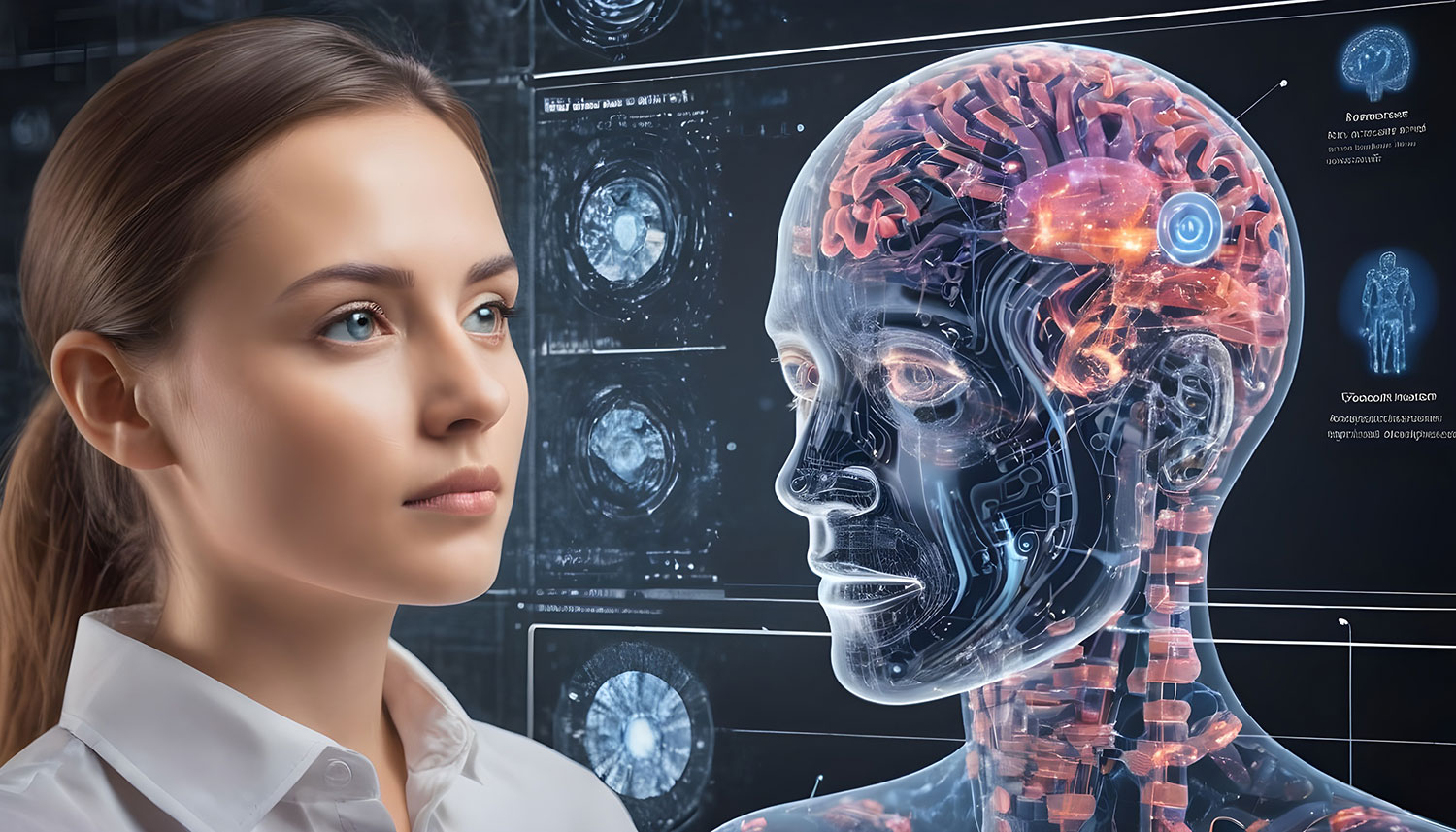
Explore the world of AI and discover how this technology can help you be more efficient, creative, and productive.
On this website you will find:
- Basic information about AI: what it is, how it works, and its different types.
- Examples of AI applications in different sectors: healthcare, finance, marketing, education, industry, and more.
- Resources for learning about AI: guides, tutorials, and courses.
- Blog with opinion articles on AI: ethics, future of technology, and relevant debates.
Start exploring today!
What is AI?
Simple definition:
Artificial intelligence (AI) is the ability of a machine to perform tasks that normally require human intelligence, such as learning, reasoning, and problem solving.
Explanation of AI types:
There are different types of AI, each with its own characteristics:
- Reactive AI: This type of AI is limited to responding to its current environment. It has no memory or planning ability. An example of reactive AI is a chess program that plays in real time.
- Limited memory AI: This type of AI can learn from its past and use that information to make decisions in the present. An example of limited memory AI is a chatbot that can remember a user's preferences.
- Theory of mind AI: This type of AI can understand the beliefs, desires, and intentions of other people. An example of theory of mind AI is a robot that can interact socially with humans.
- Self-aware AI: This type of AI is hypothetical and has not yet been developed. It would be able to understand its own existence and place in the world.
Impact of AI on society:
AI is having a significant impact on society in many ways, such as:
- Automation: AI is automating many tasks that were previously performed by humans, which is transforming the labor market.
- Efficiency improvement: AI can help businesses become more efficient and productive, which can lead to economic growth.
- Problem solving: AI can help solve complex problems in areas such as healthcare, climate change, and education.
- Ethical challenges: AI also presents some ethical challenges, such as algorithmic discrimination and loss of privacy.
In summary, AI is a powerful technology with the potential to transform our lives in many ways. It is important that we understand the different types of AI, its impact on society, and the ethical challenges it presents.
 Benefits of AI
Benefits of AI
AI has the potential to offer a wide range of benefits for society as a whole. These benefits can be divided into three main categories:
Efficiency:
- Automation: AI can automate repetitive and tedious tasks, freeing up human time and resources for more creative and strategic activities.
- Optimization: AI can analyze large amounts of data to identify inefficiencies and optimize processes, which can lead to increased productivity and profitability.
- Improved decision-making: AI can help businesses make more informed and accurate decisions by providing real-time information and analysis.
2. Creativity:
- Idea generation: AI can help people generate new ideas and creative solutions to complex problems.
- Personalization: AI can be used to personalize products and services to the individual needs and preferences of each user.
- Development of new technologies: AI can be used to develop new technologies and innovative solutions that were not previously possible.
3. Productivity:
- Increased production: AI can increase production by automating tasks and optimizing processes.
- Improved quality: AI can help improve the quality of products and services by identifying and correcting errors with greater accuracy.
- Cost reduction: AI can help businesses reduce costs by automating tasks and optimizing processes.
It is important to note that the benefits of AI are not limited to these three categories. AI has the potential to improve our lives in many other ways, such as in healthcare, education, transportation, and security.
However, it is also important to be aware of the potential risks of AI, such as job loss, algorithmic discrimination, and lack of control over the technology. It is necessary to develop AI in a responsible and ethical way so that we can maximize its benefits and minimize its risks.
Here are some specific examples of how AI is being used to generate benefits in different sectors:
- In the healthcare sector, AI is being used to develop new drugs and treatments, diagnose diseases, and provide personalized medical care.
- In the education sector, AI is being used to personalize learning, provide real-time tutoring, and assess student progress.
- In the transportation sector, AI is being used to develop autonomous vehicles, optimize traffic management, and improve road safety.
These are just a few examples of how AI is transforming our world. As the technology continues to develop, we can expect to see even more benefits from AI in the years to come.
4. Getting Started with AI
If you are interested in starting to use AI in your personal or professional life, there are a few steps you can follow:
1. Learn about AI:
- Read articles and blogs about AI. There are many resources available online that can help you understand the basics of AI and its different applications.
- Take online courses about AI. There are many free and paid courses available that can teach you practical AI skills.
- Attend AI events and conferences. This is a great way to meet other AI professionals and learn about the latest trends in the field.
2. Identify a problem that AI can help you solve:
- Think about the tasks you perform in your personal or professional life that could be automated or improved with AI.
- Research the different AI tools and solutions that are available. There are many AI tools and solutions available for different purposes.
- Choose a tool or solution that is right for your needs.
3. Experiment with AI:
- Use free or trial AI tools and solutions. This is a great way to learn how AI works and how it can be used to solve problems.
- Join an AI community. There are many online communities where you can ask questions, share ideas, and learn from other AI professionals.
- Participate in AI hackathons and competitions. This is a great way to test your skills and learn from others.
4. Be responsible and ethical when using AI:
- Be aware of the potential risks of AI, such as algorithmic discrimination and lack of control over the technology.
- Use AI responsibly and ethically. Make sure that the AI you use does not harm others or the environment.
- Participate in the conversation about the future of AI. It is important that everyone has a voice in how AI is developed and used.
Getting started with AI can seem daunting, but it doesn't have to be. There are many resources available to help you learn about AI and start using it in your personal or professional life.
Here are some specific resources you can use to get started:
- OpenAI: https://openai.com/
- Google AI: https://ai.google/
- DeepMind: https://deepmind.com/
- Coursera: https://www.coursera.org/courses?query=ai
With a little effort, you can start using AI to improve your life and the world around you.

